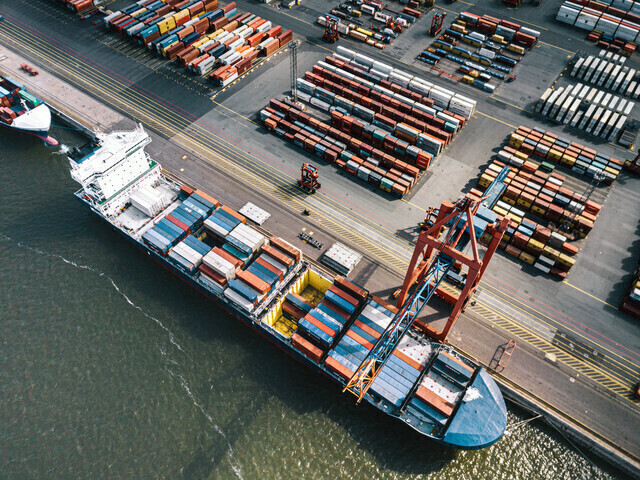hankyoreh
Links to other country sites 다른 나라 사이트 링크
S. Korea drops 2 ranks to No. 4 in exports to China

Among China’s trade partners, South Korea ranked No. 4 in terms of exports to China in May. A continued slump in exports to China has knocked Korea down two pegs on the rankings.
According to an analysis published Thursday by the Korean Economic Research Institute (KERI), affiliated with the Federation of Korean Industries, the value of Korea’s exports to China in May came to US$12.82 billion, down 23% from the year prior. That put Korea behind Taiwan (US$15.09 billion), the US (US$14.31 billion) and Australia (US$13.59).
In May 2022, Korea had ranked No. 2 behind Taiwan, at US$16.61 billion.
While there was a general trend of falls in exports among China’s top trade partners, Korea and Taiwan saw the greatest drops at 23% each. US exports were down 10%, and Japan’s exports were down 14% (US$12.4 billion), pushing it to sixth place.
Meanwhile, Australia (5%), Brazil (13%, 5th place) and Russia (10%, 7th place) saw growth in their exports to China.
Korea’s trade balance with China entered the red in May 2022, with the deficit reaching US$11.8 billion in the first five months of 2023 — just over double the US$5.2 billion deficit recorded for May through December of last year.
The deficit recorded in the first five months of 2023 accounts for 43.4% of Korea’s overall trade deficit with China (US$27.4 billion).
KERI analyzed that the competitiveness of Korea’s exports to China is rapidly deteriorating due to an export structure concentrated on a small number of items, as well as China’s increasingly self-sufficient stature in intermediate goods, and a diminishing tech gap between the two.
“There’s a good chance that the trade deficit with China is going to be prolonged or become entrenched, even if China’s economy bounces back,” commented Lee Seung-suk, a research fellow at KERI. “While diversifying trade items will be necessary in the long term, securing a ‘super gap’ in export competitiveness revolving around key areas like chips and rechargeable batteries needs to come first.”
By Kim Hoe-seung, senior staff writer
Please direct questions or comments to [english@hani.co.kr]

Editorial・opinion
![[Editorial] Perilous stakes of Trump’s rhetoric around US troop pullout from Korea [Editorial] Perilous stakes of Trump’s rhetoric around US troop pullout from Korea](https://flexible.img.hani.co.kr/flexible/normal/500/300/imgdb/original/2024/0509/221715238827911.jpg) [Editorial] Perilous stakes of Trump’s rhetoric around US troop pullout from Korea
[Editorial] Perilous stakes of Trump’s rhetoric around US troop pullout from Korea![[Guest essay] Preventing Korean Peninsula from becoming front line of new cold war [Guest essay] Preventing Korean Peninsula from becoming front line of new cold war](https://flexible.img.hani.co.kr/flexible/normal/500/300/imgdb/original/2024/0507/7217150679227807.jpg) [Guest essay] Preventing Korean Peninsula from becoming front line of new cold war
[Guest essay] Preventing Korean Peninsula from becoming front line of new cold war- [Column] The state is back — but is it in business?
- [Column] Life on our Trisolaris
- [Editorial] Penalties for airing allegations against Korea’s first lady endanger free press
- [Editorial] Yoon must halt procurement of SM-3 interceptor missiles
- [Guest essay] Maybe Korea’s rapid population decline is an opportunity, not a crisis
- [Column] Can Yoon steer diplomacy with Russia, China back on track?
- [Column] Season 2 of special prosecutor probe may be coming to Korea soon
- [Column] Park Geun-hye déjà vu in Yoon Suk-yeol
Most viewed articles
- 1Nuclear South Korea? The hidden implication of hints at US troop withdrawal
- 2[Editorial] Perilous stakes of Trump’s rhetoric around US troop pullout from Korea
- 3‘Free Palestine!’: Anti-war protest wave comes to Korean campuses
- 4Korea likely to shave off 1 trillion won from Indonesia’s KF-21 contribution price tag
- 5In Yoon’s Korea, a government ‘of, by and for prosecutors,’ says civic group
- 6With Naver’s inside director at Line gone, buyout negotiations appear to be well underway
- 7[Photo] ‘End the genocide in Gaza’: Students in Korea join global anti-war protest wave
- 8Seoul getting its first-ever vertical farm
- 9‘We must say no’: Seoul defense chief on Korean, USFK involvement in hypothetical Taiwan crisis
- 10Behind-the-times gender change regulations leave trans Koreans in the lurch